Germany
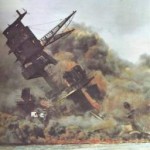
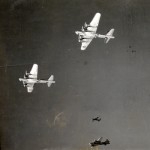 World War II had been raging since September 1, 1939. It was without doubt the most destructive war in history. Some say it was simply a continuation of World War I, that had ended in 1918. Others will blame the 1931 Japanese seizure of Manchuria from China, or Italy’s invasion and defeat of Ethiopia in 1935, or Adolf Hitler’s re-militarization of Germany in 1936, or the Spanish Civil War 1936 to 1939, or Germany’s occupation of Czechoslovakia in 1938 as possible beginnings. But, the two dates most often mentioned as “the beginning of World War II” are July 7, 1937, when the “Marco Polo Bridge Incident” led to war between Japan and China, and September 1, 1939, when Germany invaded Poland, which led Britain and France to declare war on Hitler’s Nazi state in retaliation. To me it would seem that the tensions that had begun before World War I, simply never went away. It would seem that there were many world leaders who were power hungry, and greedy for the lands that belonged to their neighbors. And when you look at the Middle East today, maybe not much has really changed.
World War II had been raging since September 1, 1939. It was without doubt the most destructive war in history. Some say it was simply a continuation of World War I, that had ended in 1918. Others will blame the 1931 Japanese seizure of Manchuria from China, or Italy’s invasion and defeat of Ethiopia in 1935, or Adolf Hitler’s re-militarization of Germany in 1936, or the Spanish Civil War 1936 to 1939, or Germany’s occupation of Czechoslovakia in 1938 as possible beginnings. But, the two dates most often mentioned as “the beginning of World War II” are July 7, 1937, when the “Marco Polo Bridge Incident” led to war between Japan and China, and September 1, 1939, when Germany invaded Poland, which led Britain and France to declare war on Hitler’s Nazi state in retaliation. To me it would seem that the tensions that had begun before World War I, simply never went away. It would seem that there were many world leaders who were power hungry, and greedy for the lands that belonged to their neighbors. And when you look at the Middle East today, maybe not much has really changed.
Wherever you place the beginning of World War II, you would agree that while the Japanese and the Germans may not have been war weary, the rest of the world really was. Before the Japanese attacked Pearl Harbor on December 7, 1941, the United States had somehow managed to stay out of the conflict. Whether that was right or wrong is a matter of opinion too. Nevertheless, when the Japanese brought the war to our front door, the United States answered with a vengeance. I’m sure the allies were glad to have the reinforcements, but also wondered why it had taken so long for us to get involved. Sometimes, I have wondered that myself, about that and other wars that we have come into just a little bit late in the game.
That said, we got into the war, and I believe that the extra military might that the United States brought to the Allied Forces was the tipping point in the war, because a war that had officially raged since September 1, 1939, was brought to an end on September 2, 1945, when Victory over Japan was celebrated in the United States. Japanese troops finally surrendered to Americans on the Caroline, Mariana, and Palau islands. Representatives of their emperor and prime minister were preparing to formalize their declaration of defeat. In Tokyo Bay, aboard the Navy battleship USS Missouri, Japanese foreign minister, Mamoru Shigemitsu and chief of staff of the Japanese army, Yoshijiro Umezu, signed the “instrument of surrender.” General Douglas MacArthur, commander of the US Army forces in the Pacific, and Admiral Chester Nimitz, commander of the US Pacific Fleet were there to represent the Allied victors.
After the surrender, Mamoru Shigemitsu was found guilty of war crimes. He was sentenced to seven years in prison. Oddly, it was he who had fought for concessions on the Japanese side in an attempt to secure an early peace. He was paroled in 1950 and went on to become chairman of Japan’s Progressive Party. General 
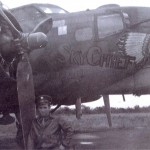 MacArthur would come up against him again when he was named commander in chief of the United Nations forces in Korea in 1950. For some people, it would seem, that one defeat simply isn’t enough, but that is another story. Today is VJ Day…Victory over Japan Day. It may not be a day that we remember as well as we do D Day, which simply stands for the day designated to storm the beaches at Normandy, or the attack on Pearl Harbor, but VJ Day is in reality as important a day as those others too, because it was the day that ended the world’s worst, and most destructive war.
MacArthur would come up against him again when he was named commander in chief of the United Nations forces in Korea in 1950. For some people, it would seem, that one defeat simply isn’t enough, but that is another story. Today is VJ Day…Victory over Japan Day. It may not be a day that we remember as well as we do D Day, which simply stands for the day designated to storm the beaches at Normandy, or the attack on Pearl Harbor, but VJ Day is in reality as important a day as those others too, because it was the day that ended the world’s worst, and most destructive war.
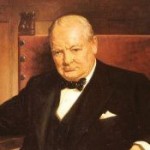 Over the thousands of years since man has been on the Earth, amazing people, as well as evil people, have made memorable speeches. Some speeches were never expected to be memorable or historic, and others were expected to be so, because they were designed to be uplifting, inspirational, morale building, or a tribute filled with gratitude. It was the latter that inspired Sir Winston Spencer Churchill to make his speech on August 20, 1940. Europe was entrenched in World War II and things weren’t going as well as they had hoped. They had taken a few rather large beatings from the Germans, and morale was not as high as they had hoped. The speech was given as the United Kingdom prepared for the expected German invasion. After a series of defeats for the Allies over the prior months, Churchill was trying to tell the people that they were in a much better position now. He was correct, of course. Shortly after the speech, the British won the battle, the first significant defeat for the previously unstoppable Wehrmacht.
Over the thousands of years since man has been on the Earth, amazing people, as well as evil people, have made memorable speeches. Some speeches were never expected to be memorable or historic, and others were expected to be so, because they were designed to be uplifting, inspirational, morale building, or a tribute filled with gratitude. It was the latter that inspired Sir Winston Spencer Churchill to make his speech on August 20, 1940. Europe was entrenched in World War II and things weren’t going as well as they had hoped. They had taken a few rather large beatings from the Germans, and morale was not as high as they had hoped. The speech was given as the United Kingdom prepared for the expected German invasion. After a series of defeats for the Allies over the prior months, Churchill was trying to tell the people that they were in a much better position now. He was correct, of course. Shortly after the speech, the British won the battle, the first significant defeat for the previously unstoppable Wehrmacht.
Times of war are often when great men make speeches to inspire the military troops to persevere. They can be a battle cry of sorts. Or they can be a reflection of such deep gratitude that it leaves us awestruck. Churchill was first moved to utter those famous words upon his exit from the Battle of Britain Bunker at RAF Uxbridge on August 16, 1940. He had been the Number 11 Group RAF Operations Room during a day of battle. Afterwards, Churchill told Major General Hastings Ismay, “Don’t speak to me, I have never been so moved.” His emotions were so deep, that he had to think about this for a time. The two were silent for a few moments, and then Churchill said, “Never in the field of human conflict has so much been owed by so many to so few.” That declaration became the basis of his speech to the House of Commons on August 20, 1940.
In his speech, Winston Churchill said, “The gratitude of every home in our Island, in our Empire, and indeed throughout the world, except in the abodes of the guilty, goes out to the British airmen who, undaunted by odds, unwearied in their constant challenge and mortal danger, are turning the tide of the World War by their prowess and by their devotion. Never in the field of human conflict was so much owed by so many to so few. All hearts go out to the fighter pilots, whose brilliant actions we see with our own eyes day after day, but we must never forget that all the time, night after night, month after month, our bomber squadrons travel far into Germany, find their targets in the darkness by the highest navigational skill, aim their attacks, often under the heaviest fire, often with serious loss, with deliberate, careful discrimination, and inflict shattering 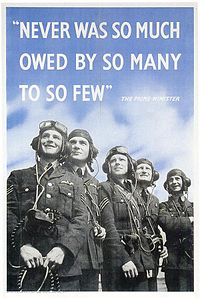 blows upon the whole of the technical and war-making structure of the Nazi power. On no part of the Royal Air Force does the weight of the war fall more heavily than on the daylight bombers who will play an invaluable part in the case of invasion and whose unflinching zeal it has been necessary in the meanwhile on numerous occasions to restrain…”
blows upon the whole of the technical and war-making structure of the Nazi power. On no part of the Royal Air Force does the weight of the war fall more heavily than on the daylight bombers who will play an invaluable part in the case of invasion and whose unflinching zeal it has been necessary in the meanwhile on numerous occasions to restrain…”
Words can be so powerful. They have the power to change the course of history when they are used to inspire soldiers in battle to a victory that seemed impossible just moments before the words were spoken. Sometimes, all it takes to bring about a victory is to listen to the one person who sees that victory, no matter how many defeats have preceded it, is still possible. Great men…men who have inspired victory…have been around a long time. These men, and women too, refuse to accept defeat. And they have the ability to speak powerfully to convince others that victory can follow defeat.
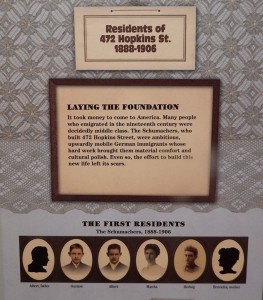 About a year ago, my cousin, Angie Schumacher Barden contacted me about a historic house that had been built by one Albert Schumacher and his family back in 1888, after they had moved from Henderson, Minnesota to Saint Paul, Minnesota. Angie wondered if these people might have been related to us. I told her that it would not surprise me, since Albert and Henrietta, who is his wife, are names that are in our family too. I expect that somewhere along the way, we will find that they are an aunt and uncle of some sort. I wish I could say that with this writing, I had found the connection, but I cannot say that yet. I have no doubt that in the near future I will find the connection, if it exists, but I have sometimes had to wait a long time, so you never know. Recently, Angie sent me pictures of the information she found at a museum, and I must say that I find it very interesting. The pictures tell not only that the Schumacher family built the house , but much of their family history, and it is from that information that my story will begin.
About a year ago, my cousin, Angie Schumacher Barden contacted me about a historic house that had been built by one Albert Schumacher and his family back in 1888, after they had moved from Henderson, Minnesota to Saint Paul, Minnesota. Angie wondered if these people might have been related to us. I told her that it would not surprise me, since Albert and Henrietta, who is his wife, are names that are in our family too. I expect that somewhere along the way, we will find that they are an aunt and uncle of some sort. I wish I could say that with this writing, I had found the connection, but I cannot say that yet. I have no doubt that in the near future I will find the connection, if it exists, but I have sometimes had to wait a long time, so you never know. Recently, Angie sent me pictures of the information she found at a museum, and I must say that I find it very interesting. The pictures tell not only that the Schumacher family built the house , but much of their family history, and it is from that information that my story will begin.
Albert and his wife, Henrietta arrived in Henderson, Minnesota in 1864. Their homeland was Germany. Now to my family, I’m sure you are beginning to see some similarities already. Albert had been trained as a confectioner in Germany, making him a really sweet guy in every sense of the word. When he arrived in Henderson, he saw he opportunity to to use those skills, so he opened up a sweet shop. He later worked for several years in the store of a merchant named Henry Poehler. He became the proprietor of the Sibley County Saloon in 1878, when Lorenz Oberst agreed to sell it to him. In 1888, decided to move his family to Saint Paul, Minnesota, where they opened up Schumacher’s Pharmacy. He had wanted to move for some time, and finally found a buyer for the saloon in one, Charles Pruetz.
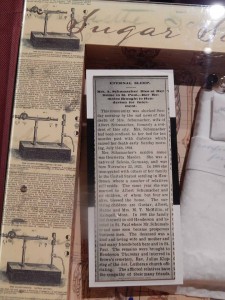
Albert and Henrietta, and the two of them had welcomed six children into the world. Joyous events to be sure, but into each life some rain must fall, and they were no exception. Of their six children, only Gustav, Albert, Margaret, and Hedwig survived. Arthur died at nine months and Camilla died after only ten days. Those were hard times for the family, but they had to go on for the other children.
Once they moved to Saint Paul, Albert and his sons built the house at 472 Hopkins Street. The family lived there from 1888 to 1906. On July 15, 1894 the family would again experience loss, when Albert’s beloved wife, Henrietta passed away. While Albert stayed in the house for six more years, I doubt if those last years were at all as happy as the first years had been. I’m sure that if those walls could talk, they would have many stories to tell about the years the family spent there. I look forward to learning more about this amazing family, and to find out for sure, if they are related to us.
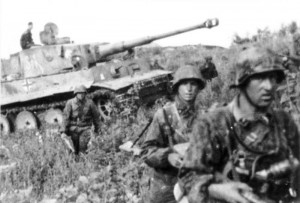 When the Germans invaded the Soviet Union in early July of 1943, they concentrated their forces near the city of Kursk in Western Russia. This was the site of a 150 mile wide Soviet resistance pocket that jutted 100 miles into the German lines. When the attack began on July 5th, the Germans had 38 divisions, of which, nearly half were armored. The Germans began their attack coming in from the north and the south, in an effort to cut off and surround the Soviet troops. Unfortunately for them, they had sorely misjudged the Soviet forces. Even though the Soviets were not really prepared for this invasion, they did have better tanks and air support than they had in previous battles. The fighting was bitter, but soon the Soviets had destroyed as much as 40 percent of the German armor, which included their new Mark VI Tiger tanks. I’m sure this must have been a shock to the Germans, who thought this tank was going to be their best tank ever, but like the Bismarck back in 1941, they found out that these new tanks were no match for what the Russians brought out.
When the Germans invaded the Soviet Union in early July of 1943, they concentrated their forces near the city of Kursk in Western Russia. This was the site of a 150 mile wide Soviet resistance pocket that jutted 100 miles into the German lines. When the attack began on July 5th, the Germans had 38 divisions, of which, nearly half were armored. The Germans began their attack coming in from the north and the south, in an effort to cut off and surround the Soviet troops. Unfortunately for them, they had sorely misjudged the Soviet forces. Even though the Soviets were not really prepared for this invasion, they did have better tanks and air support than they had in previous battles. The fighting was bitter, but soon the Soviets had destroyed as much as 40 percent of the German armor, which included their new Mark VI Tiger tanks. I’m sure this must have been a shock to the Germans, who thought this tank was going to be their best tank ever, but like the Bismarck back in 1941, they found out that these new tanks were no match for what the Russians brought out.
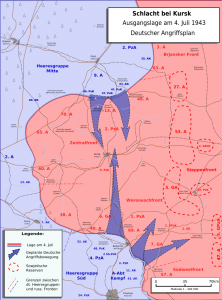
The Battle of Kursk was quite the battle. It involved 6,300 tanks, two million men, and 5,000 aircraft. It would be the largest tank battle in history, and it would end with the German offensive being driven back by the Soviets. The cost to the Germans was heavy, and the battle would be the beginning of the end for the Germans in Russia. The retreated as far as they were allowed, but Hitler was not really willing to let the retreat much. It was just another part of his insanity. He thought he could outlast the Russians. He had not learned from Bismarck or from Napoleon. It’s not surprising really. Hitler’s insanity honestly made him believe that he was invincible, a fatal mistake…at least in that he couldn’t accept the ultimate failure and so took his own life. The Battle of Kursk ended on July 13, 1943, and it did indeed mark the beginning of the end of the German invasion of Russia.
When I think of wars, for some reason I don’t think of tanks. Oh, I have seen the war movies and all, but tanks just seem clunky and awkward, and so not an efficient weapon of war in my mind. I suppose that if I know as much about tanks as my brother-in-law, Ron Schulenberg, who served in Desert Storm and was trained in the 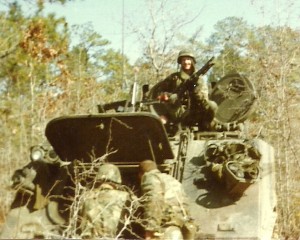 use of tanks knows, I might think they were more of a serious weapon. That is something I might have to discuss with him in the near future. The weapons used in wars are varied, and each one serves a purpose. Of course, each side tries to come up with a weapon that is far better than their opponent, and in the end, it is a matter of having the best weapon between the two enemies, and which side is able to use the weapons available to them. On this day, July 13, 1943 the Germans found out that the weapons the Russians had and their ability to use them would prove to be the undoing of their invasion. In the beginning of August, the Soviets began a major offensive around the Kursk area, and within weeks the Germans were in retreat all along the eastern front.
use of tanks knows, I might think they were more of a serious weapon. That is something I might have to discuss with him in the near future. The weapons used in wars are varied, and each one serves a purpose. Of course, each side tries to come up with a weapon that is far better than their opponent, and in the end, it is a matter of having the best weapon between the two enemies, and which side is able to use the weapons available to them. On this day, July 13, 1943 the Germans found out that the weapons the Russians had and their ability to use them would prove to be the undoing of their invasion. In the beginning of August, the Soviets began a major offensive around the Kursk area, and within weeks the Germans were in retreat all along the eastern front.
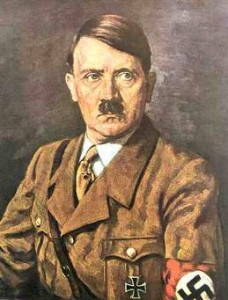 Anyone who knows much about Nazi Germany, knows that Adolf Hitler was insane. His hatred for the Jewish people was nothing less that insanity, because he had no valid reason to hate them. Nevertheless, the Holocaust did happen. Hitler did kill between five and six million Jews during his reign of terror. Many people thought that the Jews were the only target Hitler had too, but that wasn’t so. Hitler wanted to kill anyone who annoyed, inconvenienced, or even remotely bothered him. On this day, July 8, 1943, upon the German army’s invasion of Pskov, 180 miles from Leningrad, Russia, the chief of the German army general staff, General Franz Halder, records in his diary Hitler’s plans for Moscow and Leningrad: “To dispose fully of their population, which otherwise we shall have to feed during the winter.” Hitler planned to level both cities, or at least kill everyone in them, because he didn’t want to have to feed the prisoners during the long winter months! And for no other reason. Most armies at least set up prisoner of war camps, which while not terribly humane, gave some semblance of an attempt to be humane. I know that everyone complains about how the United States treats prisoners of war, but there really is no comparison, when you view the way Hitler and some other terrible dictators treat prisoners of war. Humane treatment is a pipe dream for prisoners of dictators.
Anyone who knows much about Nazi Germany, knows that Adolf Hitler was insane. His hatred for the Jewish people was nothing less that insanity, because he had no valid reason to hate them. Nevertheless, the Holocaust did happen. Hitler did kill between five and six million Jews during his reign of terror. Many people thought that the Jews were the only target Hitler had too, but that wasn’t so. Hitler wanted to kill anyone who annoyed, inconvenienced, or even remotely bothered him. On this day, July 8, 1943, upon the German army’s invasion of Pskov, 180 miles from Leningrad, Russia, the chief of the German army general staff, General Franz Halder, records in his diary Hitler’s plans for Moscow and Leningrad: “To dispose fully of their population, which otherwise we shall have to feed during the winter.” Hitler planned to level both cities, or at least kill everyone in them, because he didn’t want to have to feed the prisoners during the long winter months! And for no other reason. Most armies at least set up prisoner of war camps, which while not terribly humane, gave some semblance of an attempt to be humane. I know that everyone complains about how the United States treats prisoners of war, but there really is no comparison, when you view the way Hitler and some other terrible dictators treat prisoners of war. Humane treatment is a pipe dream for prisoners of dictators.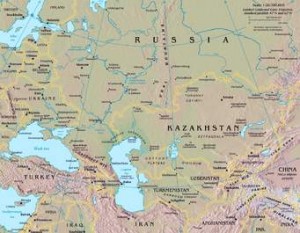
Hitler launched a massive invasion of the Soviet Union on June 22, with over 3 million men. He was highly successful, due in large part to a disorganized and unsuspecting Russian army. By July 8, they had captured 280,000 Soviet prisoners and almost 2,600 tanks were destroyed. The army was already a couple of hundred miles inside Soviet territory. Stalin was in a panic. He was so angry that he began executing generals who had failed to stop the invaders.
Halder, who was Hitler’s chief of staff, had been keeping a diary of the day-to-day decision making process. As time went on, Hitler became emboldened by his successes in Russia. Halder recorded that the “Fuhrer is firmly determined to level Moscow and Leningrad to the ground.” Halder also records the reality of Hitler’s underestimation of the Russian army’s numbers and the bitter fighting within Hitler’s own armies about strategy. Halder and some of the others wanted to make straight for the capital, Moscow. But Hitler wanted to meet up with Field Marshal Wilhelm Leeb’s army group, 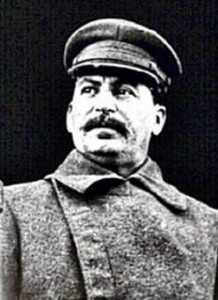 which was making its way toward Leningrad. And Hitler was, after all, in charge. But, the advantage Hitler had against the Soviets would not last very long. Winter was approaching and so was the advantage such conditions would give the Russians. The Russians were used to the severe Russian winters, and Hitler’s men were not. Like Napoleon before them, the Germans would soon find that they weren’t prepared for the Russian winter, and subsequent winters. And yet, Hitler thought he had learned from Napoleon. He ordered his troops to hold their ground. Which meant that during the Winter War, the German army was not able to pull back to more defensible positions. Consequently, the Russians were able to launch a series of counter-attacks during that first winter. These attacks cutoff some German forces, inflicted worse casualties than the Germans could inflict, but more importantly allowed the Russians to rebuild their army. The winter months proved to be just as detrimental for Hitler as they had for Napoleon. He was insane to even try such an attack.
which was making its way toward Leningrad. And Hitler was, after all, in charge. But, the advantage Hitler had against the Soviets would not last very long. Winter was approaching and so was the advantage such conditions would give the Russians. The Russians were used to the severe Russian winters, and Hitler’s men were not. Like Napoleon before them, the Germans would soon find that they weren’t prepared for the Russian winter, and subsequent winters. And yet, Hitler thought he had learned from Napoleon. He ordered his troops to hold their ground. Which meant that during the Winter War, the German army was not able to pull back to more defensible positions. Consequently, the Russians were able to launch a series of counter-attacks during that first winter. These attacks cutoff some German forces, inflicted worse casualties than the Germans could inflict, but more importantly allowed the Russians to rebuild their army. The winter months proved to be just as detrimental for Hitler as they had for Napoleon. He was insane to even try such an attack.
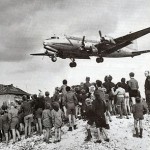 I think that every nation has opportunities to do what can be labeled as defining moments…situations when the nation dealt with an enemy or situation so well, that it can only be considered amazing. That was how the United States reacted to one of the most dramatic standoffs in the history of the Cold War. The Soviet Union decided to block off all road and rail traffic to and from West Berlin, Germany. The move was designed to basically starve the people into submission…or at least that was the plan. It was also a move that would be in defiance to all the other allies in Germany at the time. Unfortunately for the Soviet Union, the blockade turned out to be a horrible diplomatic move, but for the United States, it became a defining moment. The United States emerged from the confrontation with a renewed purpose and confidence, as well as a reputation for being a humanitarian nation.
I think that every nation has opportunities to do what can be labeled as defining moments…situations when the nation dealt with an enemy or situation so well, that it can only be considered amazing. That was how the United States reacted to one of the most dramatic standoffs in the history of the Cold War. The Soviet Union decided to block off all road and rail traffic to and from West Berlin, Germany. The move was designed to basically starve the people into submission…or at least that was the plan. It was also a move that would be in defiance to all the other allies in Germany at the time. Unfortunately for the Soviet Union, the blockade turned out to be a horrible diplomatic move, but for the United States, it became a defining moment. The United States emerged from the confrontation with a renewed purpose and confidence, as well as a reputation for being a humanitarian nation.
When World War II ended, Germany was divided into occupation zones. The United States, Great Britain, the Soviet Union, and eventually France were granted specific zones to occupy. Each nation was there to accept the surrender of Nazi forces and restore order. The Soviet Union occupied most of eastern Germany, and the other 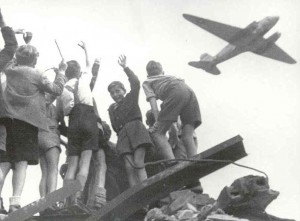 Allied nations occupied western Germany. The German capital of Berlin was divided into four sections as well. The differences between the United States and the Soviet Union were immediately evident. The Soviets were intent on thoroughly breaking the Germans…making them neutral and disarmed. Punishment was going to be at the top of the list. The United States saw things differently. They believed that the economic recovery of Western Europe depended of a strong, reunified Germany. The United States also felt that a rearmed Germany was going to be a stiff deterrent to further Soviet expansion into Western Europe. In May 1946, the Americans stopped reparations shipments from their zone to the Soviets. In December, the British and Americans combined their zones; the French joined some months later. The Soviets viewed these actions as a threat and issued more demands for more say in the economic future of Germany. On June 22, 1948, negotiations between the Soviets, Americans, and British broke down. On June 24, Soviet forces blocked the roads and railroad lines into West Berlin.
Allied nations occupied western Germany. The German capital of Berlin was divided into four sections as well. The differences between the United States and the Soviet Union were immediately evident. The Soviets were intent on thoroughly breaking the Germans…making them neutral and disarmed. Punishment was going to be at the top of the list. The United States saw things differently. They believed that the economic recovery of Western Europe depended of a strong, reunified Germany. The United States also felt that a rearmed Germany was going to be a stiff deterrent to further Soviet expansion into Western Europe. In May 1946, the Americans stopped reparations shipments from their zone to the Soviets. In December, the British and Americans combined their zones; the French joined some months later. The Soviets viewed these actions as a threat and issued more demands for more say in the economic future of Germany. On June 22, 1948, negotiations between the Soviets, Americans, and British broke down. On June 24, Soviet forces blocked the roads and railroad lines into West Berlin.
When the Soviets blocked the roads and railways, the Americans were furious. The question now became, what to do about it. Inside West Berlin there was panic. The people thought they were going to die. For a few tense 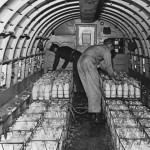 days, the world waited to see what the United States would do next. Then, just two days after the Soviets began the blockade, the United States reacted in a way that was so unexpected, and in the end, it would be a way that brought about that defining moment, and really set the stage for the humanitarian reputation the United States has today. A massive airlift of supplies was sent into West Berlin in what would become one of the greatest logistical efforts in history. For the Soviets, the escapade quickly became a diplomatic embarrassment. They looked like an international bully that was trying to starve men, women, and children into submission. The successful American airlift merely served to accentuate the technological superiority of the United States over the Soviet Union. On May 12, 1949, the Soviets officially ended the blockade.
days, the world waited to see what the United States would do next. Then, just two days after the Soviets began the blockade, the United States reacted in a way that was so unexpected, and in the end, it would be a way that brought about that defining moment, and really set the stage for the humanitarian reputation the United States has today. A massive airlift of supplies was sent into West Berlin in what would become one of the greatest logistical efforts in history. For the Soviets, the escapade quickly became a diplomatic embarrassment. They looked like an international bully that was trying to starve men, women, and children into submission. The successful American airlift merely served to accentuate the technological superiority of the United States over the Soviet Union. On May 12, 1949, the Soviets officially ended the blockade.

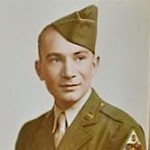 I was talking with my nephew, Steve Spethman the other day, when he mentioned that he knew very little about his grandfather, Fredrick Albert Spethman. Being a genealogy buff, I simply could not resist the challenge that presented. He had a picture of his grandfather, and knew that he had died in Oregon, and his grandmother’s first name, Joanne. He also knew his great grandfathers name, Patrick Spethman, as his own son, Xander Patrick was named after that grandfather. And he knew his great grandmother’s name, Meta Spethman. It was enough. I was able to find his grandparents’ marriage certificate and a little bit more information, including an index concerning his World War II service. The rest will come as it always does, as other people add what they know to what I have found out. Once this kind of search gets started, it always has a way of growing.
I was talking with my nephew, Steve Spethman the other day, when he mentioned that he knew very little about his grandfather, Fredrick Albert Spethman. Being a genealogy buff, I simply could not resist the challenge that presented. He had a picture of his grandfather, and knew that he had died in Oregon, and his grandmother’s first name, Joanne. He also knew his great grandfathers name, Patrick Spethman, as his own son, Xander Patrick was named after that grandfather. And he knew his great grandmother’s name, Meta Spethman. It was enough. I was able to find his grandparents’ marriage certificate and a little bit more information, including an index concerning his World War II service. The rest will come as it always does, as other people add what they know to what I have found out. Once this kind of search gets started, it always has a way of growing.
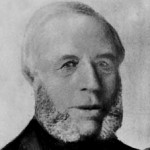 That information was exciting for me, as Steve is pretty special to me, but then I got a big surprise. Steve’s 3rd great grandfather, Johann Joachim Daniel Spethmann, who Americanized his name to John, was born in Oldenburg, Germany. To many people I don’t suppose that this information would be so interesting, but my husband, Bob Schulenberg’s family has a long history in Oldenburg. It dates back beyond the time of Steve’s grandfather’s birth, and the Schulenberg family is still there today. I’m not saying that the Spethmann family and the Schulenberg family are related, although it is entirely possible, but considering the fact that Oldenburg wasn’t that large a town back then, it is quite likely that they knew each other. Maybe, they were even friends.
That information was exciting for me, as Steve is pretty special to me, but then I got a big surprise. Steve’s 3rd great grandfather, Johann Joachim Daniel Spethmann, who Americanized his name to John, was born in Oldenburg, Germany. To many people I don’t suppose that this information would be so interesting, but my husband, Bob Schulenberg’s family has a long history in Oldenburg. It dates back beyond the time of Steve’s grandfather’s birth, and the Schulenberg family is still there today. I’m not saying that the Spethmann family and the Schulenberg family are related, although it is entirely possible, but considering the fact that Oldenburg wasn’t that large a town back then, it is quite likely that they knew each other. Maybe, they were even friends.
I realize that if you go back far enough, you will find that we are all related, as we all came from Adam and Eve, but as time has progressed, it is harder and harder to come up with the exact connections that exist between each of us. I have been able to find connections for Bob and me, on two sides of his family to one of mine. We are 10th cousins on one side and 12th cousins on another. That is such a strange thought to me, and now to find 
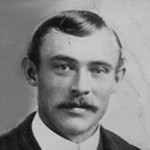 such a close connection with Steve’s family has added another interesting twist to the family history, and one that I am eager to explore. Time will tell if we are related in a way that can easily be figured…such as a marriage, and if it is the case, my guess is that I will stumble on that information, as I have in so many others, when I least expect to find such a connection. Nevertheless, finding this or any other information to add to the family history is always an exciting day, and in this case, it all started with the discovery of a common birthplace.
such a close connection with Steve’s family has added another interesting twist to the family history, and one that I am eager to explore. Time will tell if we are related in a way that can easily be figured…such as a marriage, and if it is the case, my guess is that I will stumble on that information, as I have in so many others, when I least expect to find such a connection. Nevertheless, finding this or any other information to add to the family history is always an exciting day, and in this case, it all started with the discovery of a common birthplace.
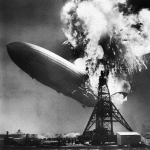 Through the years, or at least since the dawning of flight, man has tried to build flying machines that are more and more creative. Some of these have had amazing runs, like the B-17 Bomber, which was a World War II era plane, that still flies today. Others, like the Hindenburg, went down in a ball of flames. I don’t think it’s usually easy to predict which ones will succeed and which ones won’t. I seriously doubt that people would have predicted that the Concord would ever have the problems it had, or that the Goodyear Blimp would prove successful, where the Hindenburg failed. Sometimes, it’s all about finding yourself with just the right set of components, or making just one slight mistake…and sometimes, the mistake is more obvious.
Through the years, or at least since the dawning of flight, man has tried to build flying machines that are more and more creative. Some of these have had amazing runs, like the B-17 Bomber, which was a World War II era plane, that still flies today. Others, like the Hindenburg, went down in a ball of flames. I don’t think it’s usually easy to predict which ones will succeed and which ones won’t. I seriously doubt that people would have predicted that the Concord would ever have the problems it had, or that the Goodyear Blimp would prove successful, where the Hindenburg failed. Sometimes, it’s all about finding yourself with just the right set of components, or making just one slight mistake…and sometimes, the mistake is more obvious.
The Hindenburg disaster, which occurred on this day, May 6, 1937, was probably the worst slight mistake in history. The Hindenburg was Germany’s version of the most luxurious way to fly in existence at that time. It was over 800 feet long and with its state of the art Mercedes Benz engine, it flew at 85 miles per hour, and had a range of 8,000 miles. The Hindenburg carried 97 passengers, and made ten successful ocean crossings the year before the disaster. It was Germany’s Nazi government’s symbol of national pride, but it held a secret mistake that, on May 6, 1937, exploded into one of Germany’s biggest failures.
The Hindenburg was filled with seven million cubic feet of Hydrogen. The Germans used Hydrogen because of its maneuverability, even though Helium would have been much safer. The Hindenburg was supposed to arrive in New Jersey at 5:00am on that fateful day, but bad weather delayed its arrival until the later afternoon. Even then, the weather was not ideal. Rain further delayed the docking at Lakehurst. When they were finally cleared to dock, Captain Max Pruss brought the ship in too fast and had to order a reverse engine thrust. At 7:20pm a gas leak was noticed. Within minutes, the tail blew up, sending flames hundreds of feet in the air and as far down as the ground below.
The chain reaction that followed caused the entire vessel to burst into flames. There were nearly 1,000 spectators awaiting the arival, who could feel the heat of the fire from a mile away. Those on the Hindenburg 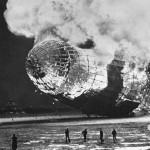 tried to jump. Some tried to jump to the docking cables, and when they fell, they were killed or critically injured. Others tried to jump as they got closer to the ground. Many were critically burned. In all 36 people lost their lives, while 56 managed to survive. Probably the main reason this crash has stayed in the minds of people over the years is that there were so many cameras to document the event. The photographs have become well known. Announcer Herbert Morrison, on WLS radio gave an unforgettably harrowing live account of the disaster, “Oh, oh, oh. It’s burst into flames. Get out of the way, please . . . this is terrible . . . it’s burning, bursting into flames, and is falling . . . Oh! This is one of the worst . . . it’s a terrific sight . . .oh, the humanity.” This truly was a disaster of monumental proportion, and it will never be forgotten.
tried to jump. Some tried to jump to the docking cables, and when they fell, they were killed or critically injured. Others tried to jump as they got closer to the ground. Many were critically burned. In all 36 people lost their lives, while 56 managed to survive. Probably the main reason this crash has stayed in the minds of people over the years is that there were so many cameras to document the event. The photographs have become well known. Announcer Herbert Morrison, on WLS radio gave an unforgettably harrowing live account of the disaster, “Oh, oh, oh. It’s burst into flames. Get out of the way, please . . . this is terrible . . . it’s burning, bursting into flames, and is falling . . . Oh! This is one of the worst . . . it’s a terrific sight . . .oh, the humanity.” This truly was a disaster of monumental proportion, and it will never be forgotten.
 My niece, Christina Masterson recently moved to Germany to live with her mother for a while. It is a wonderful opportunity for her to see the world, and still spend time with family. During the time she has been living in Germany, her family has traveled to France, as well as visiting many of the castles in Germany. I would love to have the opportunity to visit some of the places she is visiting, so I hope she knows what a blessing this is for her.
My niece, Christina Masterson recently moved to Germany to live with her mother for a while. It is a wonderful opportunity for her to see the world, and still spend time with family. During the time she has been living in Germany, her family has traveled to France, as well as visiting many of the castles in Germany. I would love to have the opportunity to visit some of the places she is visiting, so I hope she knows what a blessing this is for her.
Christina is just four days older than my grandson, Christopher Petersen, and five days older than my granddaughter, Shai Royce. The three mothers shared their entire  pregnancies…first for all three. It was a wild time. In fact, Christina’s mom, Angie almost had to leave her baby shower early to go have a baby. The funny thing was that the baby who was born last, my granddaughter, Shai was due first, and the baby that was born first, Christina was due last. Nevertheless, babies have their own timetables, and they are born when their time is right.
pregnancies…first for all three. It was a wild time. In fact, Christina’s mom, Angie almost had to leave her baby shower early to go have a baby. The funny thing was that the baby who was born last, my granddaughter, Shai was due first, and the baby that was born first, Christina was due last. Nevertheless, babies have their own timetables, and they are born when their time is right.
The three kids shared so much, but it was Christina and Shai who would become close friends. I’m sure it was because they were both girls and so they shared similar interests. For years, they were inseparable. I suppose that is what makes Christina’s move to Germany seem so strange. It’s not strange in that Christina moved, but rather that the girls wouldn’t be together anywhere near as much. That is odd, but you just don’t know what turns life will take you on. Not everyone knows what their life’s work  will be, and so trying out new things is important. I’m think that time will return Christina to the United States to stay, but you simply never know.
will be, and so trying out new things is important. I’m think that time will return Christina to the United States to stay, but you simply never know.
It is so hard for me to believe that Christina is nineteen years old today. I remember so vividly the days that her mom was pregnant with her, and her arrival. I remember so well her childhood, and all the time she and my granddaughter, Shai spent together, being crazy kids, and sometimes even driving all of us crazy with their antics. Now…suddenly, those days are over and before us stands a beautiful young lady. She is making new friends, and she has become a world traveler. I can’t believe how much has changed. She has so much potential and so much life ahead of her, and it will be exciting to see what her future brings. I know that is will be wonderful in every way. Today is Christina’s 19th birthday. Happy birthday Christina!! We miss you, because you are so far away. Have a great day!! We love you!!
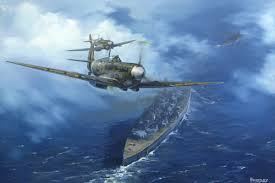 In any war, each side has just one goal in mind…winning. Of course, this is not just a video game or war games, but it is really a life and death challenge. In retrospect, I find it interesting to see some of the strategies the different sides use. While I cannot agree with anything the Germans did under Hitler’s rule, because Hitler was unbelievably ruthless, hateful, and cruel, there were some strategies that either he, his admirals, or his soldiers executed that were quite spectacular, though surprising in nature, because the Germans didn’t usually coordinate their efforts this well. I would never have wanted the Germans to win in World War II, because of their horrible treatment and murders of the Jewish people, but they did have a way of fighting that has captured my interest…at least on this day.
In any war, each side has just one goal in mind…winning. Of course, this is not just a video game or war games, but it is really a life and death challenge. In retrospect, I find it interesting to see some of the strategies the different sides use. While I cannot agree with anything the Germans did under Hitler’s rule, because Hitler was unbelievably ruthless, hateful, and cruel, there were some strategies that either he, his admirals, or his soldiers executed that were quite spectacular, though surprising in nature, because the Germans didn’t usually coordinate their efforts this well. I would never have wanted the Germans to win in World War II, because of their horrible treatment and murders of the Jewish people, but they did have a way of fighting that has captured my interest…at least on this day.
The Germans had controlled and occupied France since June of 1940. Their ships docked in French ports were drawing fire from the British. It became clear that the ships needed to escape. The German battleships Gneisenau and Scharnhorst had been anchored at the port of Brest since March of 1941, and the heavy cruiser, Prinz Eugen had been there since May of 1941. They were periodically subjected to bombing raids and damage at the hands of the British. Now it was time to turn a bad situation into a successful failure, as it were. The Germans knew they were not going to hold onto France here, so now they needed to steal away in the night without getting caught.
It was decided that they would make a mad dash up the English Channel to the safety of German waters. The 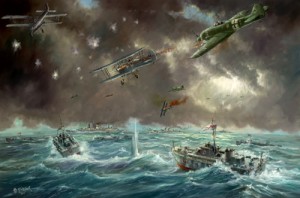 key here was to make the Channel Dash right under the watchful eye of the British Royal Navy without their notice. It was quite risky. Despite the watchfulness of the British submarines and aircraft, the German Vice Admiral, Otto Ciliax launched Operation Cerberus to lead the ships out of the French port, and to the safety of the German ports.
key here was to make the Channel Dash right under the watchful eye of the British Royal Navy without their notice. It was quite risky. Despite the watchfulness of the British submarines and aircraft, the German Vice Admiral, Otto Ciliax launched Operation Cerberus to lead the ships out of the French port, and to the safety of the German ports.
On the evening of February 11, 1942, they set their plan in motion. Accompanied by six German destroyers and twenty one torpedo boats for protection, they moved north late that evening. When daylight hit, they were joined by German planes to provide air cover as well. The air cover was led by ace pilot, Adolf Galland. He was joined by 250 other fighters in a coordinated joint effort of the German Navy and the Luftwaffe…an unusually well coordinated joint effort. The British Royal Navy scrambled to coordinate its own attack, but the late start would prove to be the undoing of the attack, because they did not realize that the escape was in progress until the afternoon of February 12th. All three of the German warships made it to a German port on February 13th, although the Gneisenau and had incurred damaged by British mines along the route. In addition to the embarrassment of the well planned escape that was carried out by the Germans, the British lost 40 aircraft and six Navy Swordfish during their confrontation. The Germans, on the other had, only lost one torpedo boat and 17 aircraft.
Nevertheless, the British would exact a revenge of sorts, when British warships sunk the Scharnhorst in December of 1944, as it attempted to attack a Russian convoy. The Gneisenau was destroyed during a bombing raid, while it was still being repaired from the prior damage, and the Prinz Eugen survived the war, but 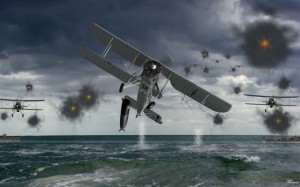 was taken over by the US Navy at the end of the war. It isn’t that I want to commend the Germans for their sneaky escape, because I don’t. They simply lived to fight…and ultimately lose, another day. It was, however, a good strategy, and I guess that even crazy dictators like Hitler, and the men he trained, could come up with an occasional good escape plan. Nevertheless, evil must not be allowed to continue, and the Germans had to be shut down, so the British, and all the other nations who stand for what is good, had to continue to fight, until Germany and its allies had no choice but to surrender. Still, February 11, 1942, the day of The Channel Dash would stand out as one of the best fights put up by the Germans, or at least, the best escape plan.
was taken over by the US Navy at the end of the war. It isn’t that I want to commend the Germans for their sneaky escape, because I don’t. They simply lived to fight…and ultimately lose, another day. It was, however, a good strategy, and I guess that even crazy dictators like Hitler, and the men he trained, could come up with an occasional good escape plan. Nevertheless, evil must not be allowed to continue, and the Germans had to be shut down, so the British, and all the other nations who stand for what is good, had to continue to fight, until Germany and its allies had no choice but to surrender. Still, February 11, 1942, the day of The Channel Dash would stand out as one of the best fights put up by the Germans, or at least, the best escape plan.

